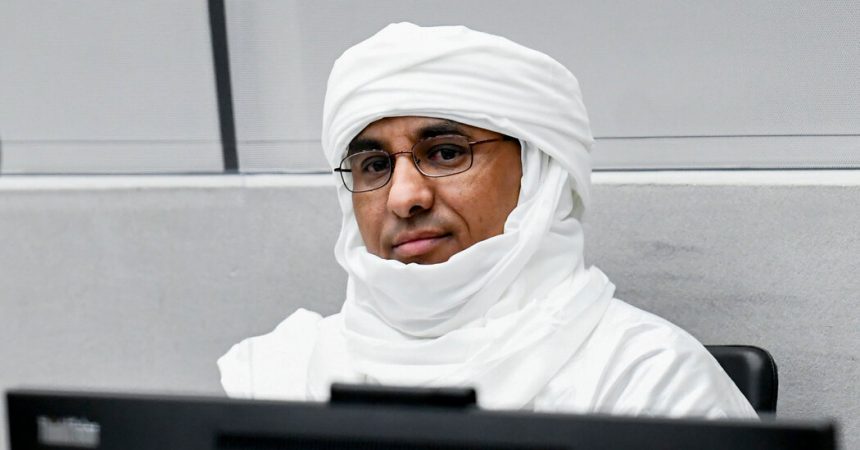Judges at the International Criminal Court convicted a Malian jihadist on Wednesday for war crimes and crimes against humanity committed during a nine-month occupation by terrorist groups of the ancient city of Timbuktu.
The three-member panel said that the man, Al Hassan Ag Abdoul Aziz, a former police leader, had played a major role within the Islamist police in organizing a structure of repression designed to impose an extreme form of Shariah law on a more tolerant form of Islam, traditional in Timbuktu, an intellectual and cultural center.
The presiding judge, Antoine Kesia-Mbe Mindua, said that Mr. Al Hassan “has been found guilty by majority decision of war crimes and crimes against humanity, including torture, cruel treatment and outrages upon personal dignity” for public floggings.
Mr. Al Hassan, 46, was also convicted of religious persecution and participating in bogus trials at an Islamist court.
Prosecutors had insisted that he was complicit in crimes against women, who were raped and turned into sexual slaves by having to marry jihadist fighters. But the judges said that while several women had testified before the court that they had been raped by the jihadist police and forced into marriages, Mr. Al Hassan had not been involved or criminally responsible in such cases.
Mr. Al Hassan was also acquitted of charges that he had participated in the destruction of mausoleums of Muslim saints, who were locally venerated. Jihadists called their worship heretical.
His sentence is expected to be handed down sometime soon, according to the court.
Mr. Al Hassan pleaded not guilty to all charges, but has not denied being a member of Ansar Dine, a jihadist group that had joined forces with AQIM, an affiliate of Al Qaeda operating in the Sahara.
The ruling on Wednesday came nearly a week after the court, based in The Hague, unsealed an arrest warrant for the founder and leader of Ansar Dine, Iyad Ag Ghaly, also known as Abou Fadl, whose whereabouts is uncertain.
Most people in Mali were not aware of the trial, said El Hadj Djitteye, an analyst who was in Timbuktu during the occupation and later founded the Timbuktu Center for Strategic Studies on the Sahel, a research center.
By contrast, he said, Mr. Ag Ghaly is one of the best-known jihadists in Mali, and any trial against him would be followed closely. That could drastically change the current, widely held perception in the West African country about the International Criminal Court — that it is irrelevant to Mali’s current troubles.
The jihadist occupation of Timbuktu became notorious at the time because the desert city was a longtime Muslim pilgrimage site and a place known for its revered mosques and collections of ancient manuscripts. French and Malian troops retook control and drove out the jihadists in early 2013.
A veteran Mauritanian filmmaker, Abderrahmane Sissako, later depicted the ordeal faced by the local population in the acclaimed 2014 movie “Timbuktu.”
In an earlier case in 2016, the court handed down a sentence of nine years to another jihadist who had shown remorse and pleaded guilty to ordering and participating in the attacks on Timbuktu’s holy sites.
The damaged mausoleums have since been restored with the help of foreign donors.
But many of the abuses against women and men, cited in Mr. Al Hassan’s trial resemble actions still being carried out in other parts of Mali and in neighboring countries.
Groups aligned with Al Qaeda and the Islamic State have unleashed more violence in the country and other parts of West Africa over the past decade, making the region known as the Sahel, a wide area south of the Sahara, a hub for terrorist activity.
In 2012, jihadist groups like Ansar Dine controlled only parts of northern Mali. Now, militants affiliated with Al Qaeda and the Islamic State have expanded into the country’s center and south, as well as into areas of neighboring Niger and more than half of Burkina Faso.
Over the years, the groups have carried out waves of attacks on villages, boats and convoys, killing tens of thousands of civilians and displacing millions of others, according to research institutes tracking the conflict and United Nations figures.
“The jihadists have deeply ingrained themselves into the local landscape,” said Ibrahim Yahaya Ibrahim, the Sahel project deputy director at the International Crisis Group who is based in Dakar, Senegal. That, he adds “has made it much harder to uproot them.”
The current conflict plaguing Mali began when a loose coalition of Tuareg rebel groups and Islamist militants seized control of large areas in the north of the country in 2012. The militants eventually imposed their rule on several towns and cities in the area, including Timbuktu, Gao and Kidal.
The French troops who uprooted Ansar Dine from Timbuktu left Mali in 2022 after a decade-long mission that many experts consider a failure. A United Nations peacekeeping operation also left Mali late last year amid souring relations with the country’s military rulers, who took power in a coup in 2020 and have allied themselves with Russia.
Besides attacks in Burkina Faso, Mali and Niger, the Qaeda affiliate that Ansar Dine is part of has carried out assaults in other West African countries, including Benin, Ghana and Ivory Coast.
Ruth Maclean contributed reporting.






